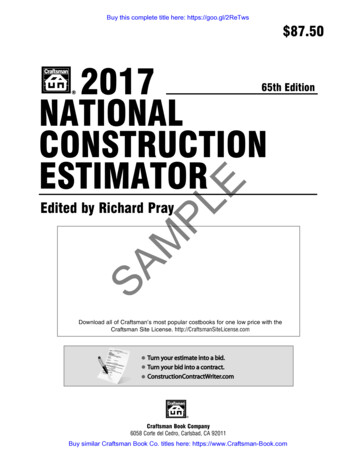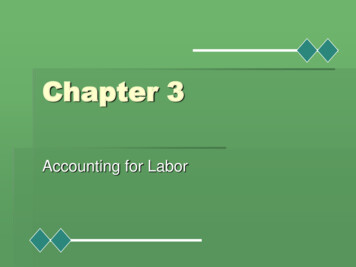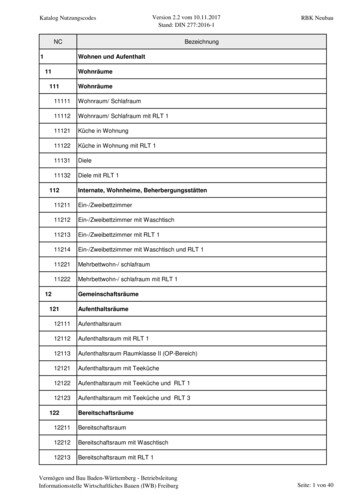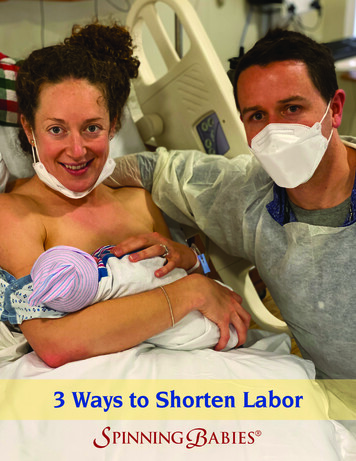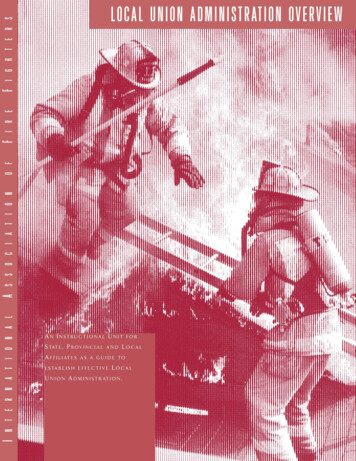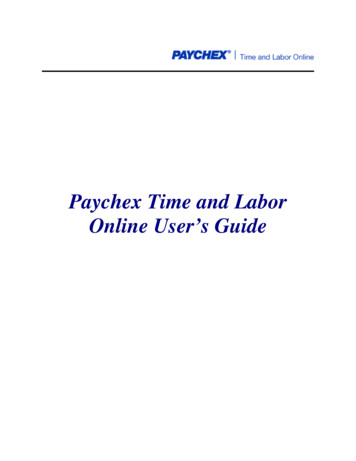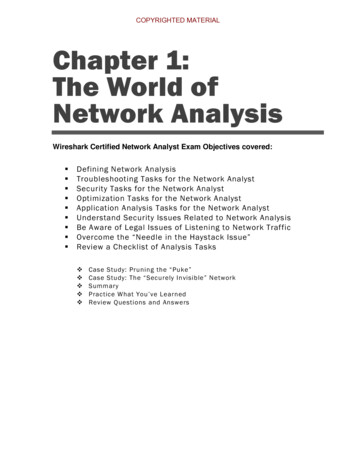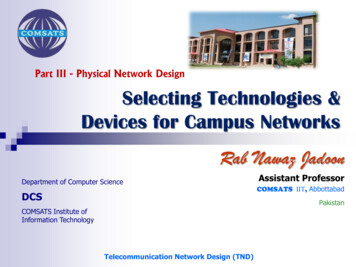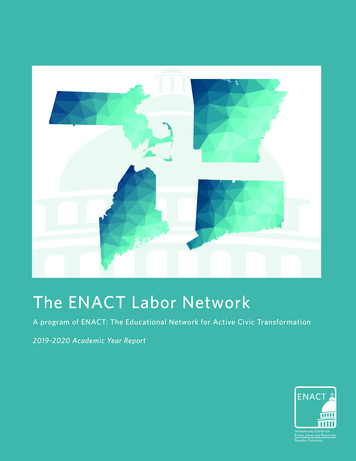
Transcription
The ENACT Labor NetworkA program of ENACT: The Educational Network for Active Civic Transformation2019-2020 Academic Year Report
nThe ENACT Labor Network pilot initiative was supported by the Louis D. Brandeis Legacy Fund for Social Justice, which isfunded in part by Ethics Center Board member Jules Bernstein ’57 and his wife, Linda Lipsett.The ENACT Labor Network was also supported by Bringing Theory to Practice, an independent national initiative operating inpartnership with the Association of American Colleges and Universities and supported by The Endeavor Foundation and theS. Engelhard Center.ENACT: The Educational Network for Active Civic Transformation, a major program of the International Center for Ethics,Justice and Public Life at Brandeis University, was made possible by a generous gift from Ethics Center Board member NorbertWeissberg and his wife, former Board member Judith Schneider.In spring of 2019 ENACT was awarded a multi-year grant from the Teagle Foundation’s “Education for American Civic Life”initiative to expand to all 50 states and to enhance ENACT’s digital platform.Editorial Assistant: Norman Abbott, MPA/MPP ‘20
The ENACT Labor NetworkA program of ENACT: The Educational Networkfor Active Civic Transformation2019-2020 Academic Year ReportTable of Contentsn Introduction – Melissa Stimell, ENACT Academic Program Director4n Reflections on the ENACT Labor Network– Jessica Santos, Heller School Faculty, Leader of ELNn About the ENACT Labor Network – David Weinstein, ENACT Assistant Director57n The Arkansas ENACT Student Fellows, Hendrix CollegeDr. Jay Barth and Dr. Peter Gess, ELN Faculty FellowsStephen Clark ’21Olivia Moore, ’218910n The Connecticut ENACT Student Fellows, University of HartfordDr. Katharine Owens, ELN Faculty FellowSydney Coleman ‘21Alena Washington ’21111213n The Maine ENACT Student Fellows, University of MaineDr. Robert Glover, ELN Faculty FellowKevin Fitzpatrick ’21Eli Munro-Ludders ‘21Harley Rogers ’2014151718n The Massachusetts ENACT Student Fellow, Brandeis UniversityMelissa Stimell, ENACT Academic Program DirectorElaina Pevide ’20BRANDEIS UNIVERSITY—INTERNATIONAL CENTER FOR ETHICS, JUSTICE AND PUBLIC LIFE19203
IntroductionIn the fall of 2019, I embarked on an experiment with four dedicated ENACT Faculty Fellows,a handful of undergraduate students from across the country, and the logistical, financialand intellectual support of the International Center for Ethics, Justice, and Public Life and theHeller School for Social Policy and Management at Brandeis University. Together, we pilotedthe ENACT Labor Network (ELN).The ELN is a pilot project of ENACT, The Educational Network for Active Civic Transformation.ENACT teaches university students about our democracy through engagement in the statelegislative process. Students are encouraged to think deeply about the complexities of shapinglaws for constituents who hold diverse viewpoints about what is right and good for society andhow best to progress through the legislative process.This upcoming academic year, ENACT will expand its network to include universities in all 50states, creating a strategic information hub linking students, faculty, activists and legislators.The ELN is a deep dive into labor issues, guided by four ENACT Faculty Fellows who graciouslyagreed to accompany me on this adventure as ELN Faculty Fellows: Jay Barth and Peter Gessof Hendrix College, Robert Glover of the University of Maine and Katharine Owens of theUniversity of Hartford.Working with a small team of students, my colleagues and I mentored students on currentstate labor issues, meeting with advocates, experts and state legislators.I must thank several people and organizations whose support has been invaluable:This pilot project is supported by a generous donation by the Louis D. Brandeis Legacy Fund forSocial Justice, which is funded in part by Ethics Center Board member Jules Bernstein ’57 andhis wife, Linda Lipsett; and by a grant from Bringing Theory to Practice. This project would notexist without the support of the Heller School of Social Policy and Management, specificallyDean David Weil, Professor and Heller Faculty Leader of the ELN Jessica Santos, and ELNGraduate Student Assistant Norman Abbott. As always, David Weinstein, Assistant Directorof ENACT, helped to organize and support all of the players.Melissa StimellENACT Academic Program DirectorProfessor of the Practice, Legal StudiesChair, Social Justice and Social PolicyDirector of Internships, Legal Studies ProgramInterim Director, International Center for Ethics, Justice and Public Life4THE ENACT LABOR NETWORK
Reflections on the ENACT Labor NetworkThe 2019-20 academic year is coming to a close at Brandeis University, and our Zoomrooms are full of students and faculty celebrating their achievements. In these COVIDdriven virtual spaces, we are showing up while adapting to a rapidly changing world fullof confusion/clarity, grief/hope, and fear/courage.Knowledge about policy, social justice, and wellbeing that just a few months ago wastheoretical and distant for some students has come sharply into focus and will shape ourcollective future.At the center of these conversations are questions about labor: Roles and rights: How does the U.S. define “essential” work? What rights to workershave to keep themselves and their families safe while also keeping them fed? Stakeholders: What is the government’s role in stabilizing labor markets and thefinancial conditions of families as the economy changes shape? What is the role of theprivate sector? Labor unions? How can we all work together to reduce inequality andensure a healthy economy? Place-based considerations: What are the most pressing labor needs in rural areas?In densely populated and diversifying cities? How can we leverage local resources andcreate strong and vibrant communities through effective legislation?The ENACT Labor Network (ELN) Student Fellows, nine motivated, principled and thoughtfulundergraduates in Massachusetts, Connecticut, Maine and Arkansas, are on my list to help usfind answers.Over the past year, these undergraduate fellows worked closely with faculty and communitystakeholders to conduct research on and advance labor legislation in their state. As you willsee in this report, they conducted hands-on legislative research and advocacy, visiting statehouses and talking directly to policymakers. They learned from nationally recognized laborscholars and experts. And perhaps most importantly, we experimented together to create anew virtual structure for cross-state learning within the thriving national ENACT program.As a result, ENACT: The Educational Network for Active Civic Transformation, based atBrandeis University’s International Center for Ethics, Justice, and Public Life, now has a newmodel of virtual learning and engagement that can be replicated and adapted into the future.As the ELN Heller School Faculty Leader, I was inspired by our student fellows’ deepcommitment to social change, which they demonstrated through incisive questions and anopenness to learning at our monthly Zoom meetings and expert sessions.After just two semesters, I now think of them a cohort of emerging leaders and look forwardto hearing about the changes they enact in their communities. I suspect that much of their— continued—BRANDEIS UNIVERSITY—INTERNATIONAL CENTER FOR ETHICS, JUSTICE AND PUBLIC LIFE5
learning can be attributed to having incredible role models in the four ELN Faculty fellows whoguided and mentored them throughout. The ELN Faculty Fellows’ creativity and dedication tostudent growth represents the best of higher education.For some, the COVID-19 pandemic has radically shifted priorities. For me, it primarilyreinforces the need for programs like ENACT and the ENACT Labor Network that combinehigh quality education, civic engagement, leadership development, and social justice.Knowing that these ENACT Labor Network Student Fellows are our future policymakers,advocates, researchers, and labor leaders tips the scale for me, and leaves me wrapping up theacademic year with clarity, hope, and courage.Jessica Santos, PhDENACT Labor Network Heller School Faculty LeaderDirector of Community-Engaged ResearchInstitute on Assets and Social PolicyHeller School for Social Policy and ManagementBrandeis University6THE ENACT LABOR NETWORK
Engaging with Leaders and Becoming LeadersOver the course of this academic year, ENACT Labor Network faculty and staffexperimented with technology and pedagogy to establish and grow a cohesive networkthat linked faculty, students, and local and national experts together in innovative ways.David Weil, Dean of Brandeis University’s Heller School of Social Policy and Management,introduced us to two nationally recognized economists and policy experts representingdifferent perspectives on labor, based at policy think tanks on different ends of the politicalspectrum.ELN Student Fellows had video conference calls with Heidi Shierholz, Senior Economist andDirector of Policy at the Economic Policy Institute, who has educated policymakers, journalists,and the public about the effects of economic policies on low- and middle-income familiesthroughout her career; and Michael Strain, the John G. Searle Scholar and director of economicpolicy studies at the American Enterprise Institute, who oversees the Institute’s work in economicpolicy, financial markets, poverty studies, technology policy, energy economics, health care policy,and related areas.In December, the ELN Student Fellows met via video call with Sam Hyun, a Heller Schoolgraduate student who has worked as a legislative aide to the Speaker of the MassachusettsState House. He shared his insider’s perspective of state legislative advocacy, and discussedhow legislators and advocates navigate competing priorities within the State House.In the spring they spoke with Dean David Weil, an internationally recognized expert inemployment and labor market policy and administrator of the Wage and Hour Division atthe United States Department of Labor under President Obama; and with Ethics CenterInternational Advisory Board Member Jules Bernstein ’57, a Washington, D.C.-based laborlawyer who has advocated for workers’ rights for more than a half-century.It has been exciting to see ELN Student Fellows extend the ENACT one semester experienceto a full year of research into their chosen issue and engagement in their state’s legislativeprocess.The ELN Student Fellows explored each others’ topics and state contexts as well, and developeddeeper and broader understandings of labor issues nationally. They also served as resources toENACT students in courses around the country as some of those students also focused on laborrelated bills.In ENACT we often share the words of Supreme Court Justice Louis Brandeis: “The mostimportant office, and the one which all of us can and should fill, is that of private citizen.” TheENACT Labor Network Student Fellows are models of what it can mean to fill that office.David WeinsteinAssistant Director of ENACTBRANDEIS UNIVERSITY—INTERNATIONAL CENTER FOR ETHICS, JUSTICE AND PUBLIC LIFE7
Arkansas – Hendrix CollegeDr. Jay Barth and Dr. Peter GessENACT Labor Network Faculty FellowsDuring the 2019-20 academic year at Hendrix College in Conway, Arkansas, two juniorstudents—Olivia (Livi) Moore and Stephen Clark—were our ENACT Labor NetworkStudent Fellows working on separate projects. Dr. Peter Gess worked closely withLivi across the year while Dr. Jay Barth worked with Stephen, a student who had also been aparticipant in his ENACT course — Arkansas Politics and Government — in the spring of 2019.Both students were registered for independent study credits in the fall 2019 semester providingthem sufficient time to carry out their work. In the spring semester, the students refined theirprojects into publishable reports on the two labor-related topics that were at the heart of theirresearch.Dr. Jay BarthDr. Peter GessLivi, an interdisciplinary studies major with an emphasis on health economics, took on animportant policy issue shared by many rural states: primary care physician shortages and thedecline of rural health care access. As the state of Arkansas has struggled to alleviate thisproblem, various policy approaches have been led by the state’s premier medical school, theUniversity of Arkansas for Medical Sciences.Starting with these approaches as a baseline, Livi crafted new approaches to attacking theproblem, including increasing the number of viable residency programs in rural areas of thestate and approval of additional responsibilities for nurse practitioners. Livi is hopeful she willbe able to continue to promote her ideas in the coming year; she was just named a NewmanCivic Fellow, and access to healthcare is the centerpiece of her fellowship and leadershipdevelopment. Clearly this topic is a passion of Livi’s as she seeks graduate work in medicine andfurthers a commitment to public health.Stephen, a politics major with a deep interest in public policy at the state level, examined anissue that is more distinctive to Arkansas: wage theft. Arkansas is only one of a handful ofstates without a requirement that workers be provided a paycheck that details hours worked,pay, and overtime. While previous efforts have been made in legislative sessions to bring thestate’s policy into the mainstream, these have been unsuccessful. Stephen analyzed previouslegislative efforts on the issue of pay transparency, refined a version of the legislation thatshould be brought forward in 2021, and developed a survey to be carried out by advocates toascertain the amount of wage theft actually occurring in the state to help justify the need forthe legislation.As ENACT Labor Network Student Fellows, both students had the time and space to engagein high-level, analytical research and were able to explore the economics and politics of thesepolicy challenges. The policy analysis skills they developed will follow them into their senioryears at Hendrix and beyond as they continue to develop their vocations and the ArkansasGeneral Assembly returns to regular session.Personally, we both really enjoyed working with Livi and Stephen and witnessing theirtremendous growth over the year. For Jay, it was a wonderful way to extend his previous workin teaching an ENACT course; for Pete, a new ENACT Faculty Fellow, it helped jumpstart thedevelopment of his ENACT course on politics and policymaking in the Arkansas context.8THE ENACT LABOR NETWORK
Wage TheftStephen ClarkHendrix College ’21During my ENACT Labor Network fellowship I focused on wage theft in Arkansas.Arkansas is one of the poorest states in the country and a large portion of its workingpopulation is vulnerable to wage theft. It is the lack of laws protecting these workers thatmade me want to focus on wage theft. Arkansas is one of nine states to have no requirementsregarding pay stubs. Pay stubs allow workers to know exactly what their hourly rate is and whatdeductions they are subject to. This helps prevent employers from failing to pay for overtime ortrying to make illegal deductions to a worker’s payI worked with a coalition of labor advocacy groups. They were a big help in putting me incontact with representatives throughout the legislature. Arkansas is a ruby red state, so attimes it easy to feel dejected about creating changes to labor law. My meetings with advocacygroups not only helped me network, but they showed people were at the very least attemptingto enact progressive labor legislation.My experience has taught me how to properly craft a survey and materials to aid advocacyefforts, and I will be taking a bevy of useful contacts for future advocacyefforts.“At times it easy to feel dejected about creatingchanges to labor law. However, my meetings withadvocacy groups not only helped me network,but they showed people were at the very least”attempting to enact progressive labor legislation.BRANDEIS UNIVERSITY—INTERNATIONAL CENTER FOR ETHICS, JUSTICE AND PUBLIC LIFE9
Improving Rural Access to HealthcareOlivia MooreHendrix College ’21During my time with the ENACT Labor Network (ELN), I focused on Arkansas’ Senate Bill189, which was narrowly stuck down in February 2019. If passed, it would have expandednurse practitioner’s ability to practice independently. This issue, however, was importantto me because increasing scope of practice for nurse practioners would improve rural accessto healthcare. Although a lack of access to healthcare is plaguing the United States as a whole,Arkansas is primarily rural, and feels this shortage more acutely.The most difficult aspect of this project was identifying a single issue, because healthcare is amultifaceted field that is not only highly technical, but personal. Hospitals are at the center ofrural communities, yet they are continuing to close without adequate funding.Initially, I examined how one might increase funding, speaking with Dr. Tamara Jones, aformer NIH researcher, and Dr. Mary Aitken, a pediatrician and former Director of Researchfor Arkansas Children’s Hospital, to formulate a source of financial support to preserve ruralhospitals. I quickly found that pouring money into the issue would not be enough, because theissue was not in funding, but in the willingness of primary care providers to live and work inrural communities.“I was inspired bythe chance to meeta successful femaleeconomist, and atthe enthusiasm thatshe showed for myefforts to improve ruralhealth access.At thatmoment, my dreamsfelt more accessible tome than ever beforeand I will carry thatrealization with me anytime that I experience”doubt.10THE ENACT LABOR NETWORKAfter diligent research, I found that nurse practitioners would be willing to work in these areasand could provide comparable care, but needed the ability to practice to do so. The greatestsurprise that came from my research was more closely examining the relationship betweenphysicians and nurse practitioners and being pressed to acknowledge the fact that physiciansare seeking to stifle competition, thus exacerbating the inequalities in health between ruralcommunities and urban centers of medicine.The greatest surprise and most inspiring aspect of participating in the ENACT Labor Networkfellowship was having the opportunity to interact with prominent economists and politicaladvisors. For example, when meeting with Heidi Shierholz, I was in awe of the opportunity tospeak with an economist who had served in the Obama administration. I was inspired by thechance to meet a successful female economist, and at the enthusiasm that she showed for myefforts to improve rural health access. I am not used to seeing women in economics, much lessin such prominent positions. At that moment, my dreams felt more accessible to me than everbefore. I will carry that realization with me any time that I experience doubt.My best advice for future ELN Student Fellows would be to open oneself up to developingconnections with others and using those connections to develop novel solutions or gain newperspectives.Although I have studied political reform, immersing myself in it was entirely different thanturning the pages of a textbook. I found myself working to bridge the gaps between individuals,which I feel is the purpose of good legislation. The human experience is just as integral to theprocess as technical understanding. I was thankful to have an opportunity to integrate politicalknowledge, economic understanding, and scientific principles to formulate a multifacetedsolution to a multifaceted issue.
Connecticut – University of HartfordDr. Katharine OwensENACT Labor Network Faculty FellowStudents Sydney Coleman and Alena Washington from the University of Hartford beganby collaborating with me to learn more about labor issues in the state of Connecticut. Inresearching this field in Connecticut, we explored recently passed policies as well as thosethat failed to pass in the previous legislative session.Our quest to better understand the scope of labor issues in the state led to early meetings withJennifer Berigan of the Connecticut AFL-CIO. Through this data gathering process we narrowedthe field to a handful of prospective bills that we thought would be important to follow duringthe 2020 legislative session. We focused on a bill on captive audiences and one on publicemployees joining a union (legislation aimed to mitigate the impacts of the US SupremeCourt’s Janus v. AFSCME decision).Dr. Katharine OwensAs ENACT Labor Network (ELN) Student Fellows, Sydney and Alena had the advantage ofcollaboration and discussions with the other ELN student fellows, as well as the opportunity totake part in meetings with policy experts and young political leaders.We were quite fortunate that both Sydney and Alena were accepted for internships with theAFL-CIO office in Connecticut. This allowed them to learn skills, strategies, and also to betterunderstand the stakeholders involved in policymaking in our state.Our session was just getting busy when things were called off, but before the complicationsfrom COVID-19, students were able to attend internal and external meetings as well as hearingswith Ms. Berigan. They both worked to interview people who would be impacted by the policiesunder consideration. Working with Ms. Berigan allowed the students to move beyond theknowledge typically relegated to textbooks or classroom discussions. In contrast, they wereable to put concepts into practice.The 2019-2020 academic year proved unusual for both students and faculty. Though the springsemester brought abrupt changes for all of us, the students gained valuable experience andirreplaceable first-hand knowledge during their work with the ENACT Labor Network.BRANDEIS UNIVERSITY—INTERNATIONAL CENTER FOR ETHICS, JUSTICE AND PUBLIC LIFE11
The Right of a Public Employee to Join orSupport a UnionSydney ColemanUniversity of Hartford ‘21As an ENACT Labor Network (ELN) Student Fellow, I was able to connect withConnecticut’s AFL-CIO and focus on a crucial labor bill during this legislative session;HB 5720: An Act Concerning the Right of a Public Employee to Join or Support a Union.I chose this bill because I believe all employees must have the right to join a union since unionsare essential in ensuring a safe and fair workplace.HB 5720 provides public employees the right to join or support a union and ensures membershave the right to meet with unions and hold meetings during the workday while ensuring a safeand fair worksite that offers clear methods of membership and dues collection.I worked alongside another ELN Student Fellow, Alena Washington, who focused on a captiveaudience bill. We worked together to research and understand our prospective bills and alsocreated story cards for legislators on the Labor and Public Employees Committee.At the beginning of the spring semester, I began interning for the AFL-CIO in the legislativebuilding in Hartford for the upcoming legislative session. During the internship, I had theopportunity to write testimony, get to know legislators, write for the weekly newsletter, trackbills, and attend committee meetings and public hearings.“I learned so muchabout the policymakingprocess as well as thelegislative process. Igot familiar with billtracking, updating,and prioritizing. I wasable to learn aboutwhat lobbyists do andhow much they careabout these bills thatrepresent so manyinfluential peoplethat are taken for”granted.12THE ENACT LABOR NETWORKOne of my biggest challenges during my ELN fellowship was educating Republican senatorsand representatives on the Labor and Public Employees Committee about the importance ofthe bills. It was a challenge to convey to them that this was an issue that affects many workersacross Connecticut. Some thought that nobody in their district was affected, and leanedtowards voting against it. Others were more concerned about how unions affect employersrather than employees.This pushed me to research more and learn who is directly impacted by this bill. I eventuallymet Ally Sexton from the AFL-CIO, and was able to obtain the data detailing the number ofunion workers living in each town in Connecticut. Many of the Democrats on the Labor andPublic Employees Committee sponsor a majority of the AFL-CIO’s bills and are pro-union, sothey didn’t take much convincing.During my internship, I sat in on many committee meetings. In the last meeting to raise billsbefore public hearings began, the Republican members on the Labor and Public EmployeesCommittee were unsettled that so many Republican bills were cut in screening. Theycollectively attempted to run out the time remaining in the session and didn’t vote on a singlebill on the agenda. They did this by asking many questions that were confusing and were notrelevant to the bills. Over 14 bills died in committee since they weren’t raised and didn’t get theopportunity to be voted on.This was an essential experience for me because it helped me see how politics actually functionsand led me to not let my emotions cloud my thinking. Because many of the bills that didn’t getraised were very important to me and the room of people in the meeting, it hurt me to see thatthe trivial details were more significant to our legislators than helping the people that live inConnecticut. But observing the process in person and how it works helped me understand it.
I will be taking away a lot from this experience. I was introduced to a different world of politicsworking in the capital. I learned so much about the policymaking process as well as thelegislative process. I got familiar with bill tracking, updating, and prioritizing. I was able to learnabout what lobbyists do and how much they care about these bills that so many people take forgranted.This experience inspired me to continue my pursuit of politics and opened the world oflobbyists up to me. I would offer the following piece of advice to future ELN Student Fellows:take advantage of any and all opportunities that interest you. I took advantage of theopportunity to work with ENACT and then to work on a bill that the AFL-CIO was supporting.It led me to work in the Connecticut state capital, which introduced me to so many otheropportunities! So, keep up the great work, the world is your oyster.Captive Audience Meetings In the WorkplaceAlena WashingtonUniversity of Hartford ’21During my ENACT Labor Network fellowship, I worked with the Connecticut AFL-CIO andfocused on passing legislation that would end captive audience meetings in workplacesthroughout the state. Once I learned that employees were being forced to listen tospeeches given by their employer on topics such as politics, religion, and unionizing or faceunjust consequences, it seemed completely wrong and worth fighting for change.Looking back, I would say my time interning with the Connecticut AFL-CIO was the best partof the ELN experience. If given the chance, everyone should look into interning with a partnerorganization during their time with the ENACT Labor Network. However, this almost didn’thappen: my biggest challenge was stepping out of my comfort zone and actually applying forthe ENACT Labor Network. When I considered doing so I kept thinking I would never get in andthat the chance would be slim so pushing myself to apply was my biggest struggle.From this experience I will take the amazing connections I made with staff, volunteers andpartners at the Connecticut AFL-CIO as well as with my advisor, Dr. Owens, who I previouslyhad not had the chance to get to know. By participating in ENACT and the ELN Fellowship I wasable to get to know her and work with her on a more personal level.“Once I learned thatemployees were beingforced to listen toTo future ELN Student Fellows I would say that you should treat this as if it is one of your classesand in doing so, make sure you do not overload your schedule. By treating the ELN fellowship asone of your classes, you will structure your semester or year in a way that is conducive to beingable to put more time and energy in, just like you would a class.speeches given by theiremployer or they faceunjust consequences,it seemed completelywrong and worth”fighting for.BRANDEIS UNIVERSITY—INTERNATIONAL CENTER FOR ETHICS, JUSTICE AND PUBLIC LIFE13
Maine – University of MaineDr. Robert GloverENACT Labor Network Faculty FellowThis academic year, I had the pleasure of mentoring and supporting three University ofMaine students as part of the ENACT Labor Network: Kevin Fitzpatrick, Elijah MunroLudders, and Harley Rogers. Though the COVID-19 crisis caused Maine’s legislativesession to adjourn prematurely, the students got the opportunity to work closely with policyadvocates and organizers at two of the state’s largest unions.Dr. Robert GloverOver the course of the year, they provided research support, partook in policy development,helped craft talking points for advocacy efforts, met with lawmakers and executive branchofficials, and so much more. Our weekly check-ins and ENACT-wide video conferencessupplemented this hands-on work with a focus on the mechanics of Maine state policymakingand Maine political culture, as well as linking our students with the expertise of respected laborpolicy experts.The students’ work covered a range of issues: addressing substandard labor practices in statesub-contracting; providing protections for communities facing closure of large employers; andensuring a safe workplace free of risks such as asbestos and black mold in public buildings. Andthough the Maine State Legislature had to postpone consideration of the active legislation thatstudents were working on due to COVID-19, important momentum was made towards policysolutions in a future special session or subsequent regular session in 2021.As we know, policy battles on complex issues are often a “marathon” rather than a “sprint.” Andthe work that our Maine ELN
Student Fellows working on separate projects. Dr. Peter Gess worked closely with Livi across the year while Dr. Jay Barth worked with Stephen, a student who had also been a participant in his ENACT course —


